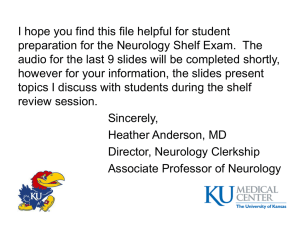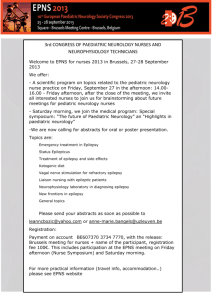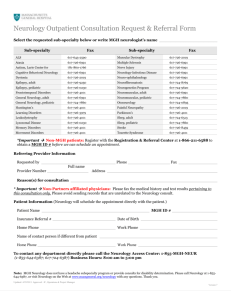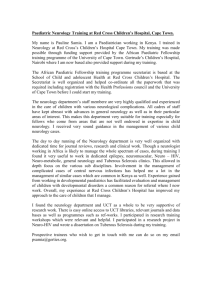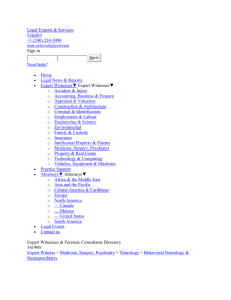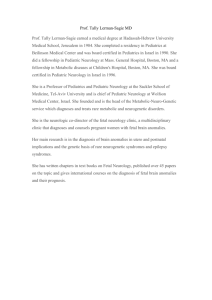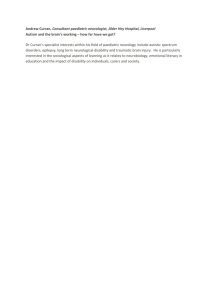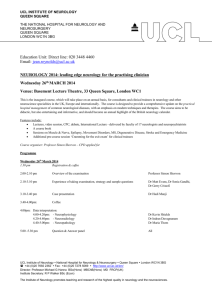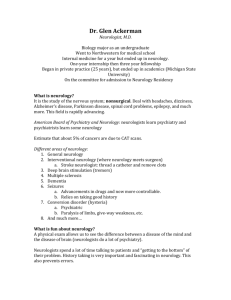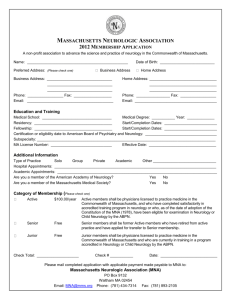AIIMS WEBSITE INFORMATION revision 1
advertisement
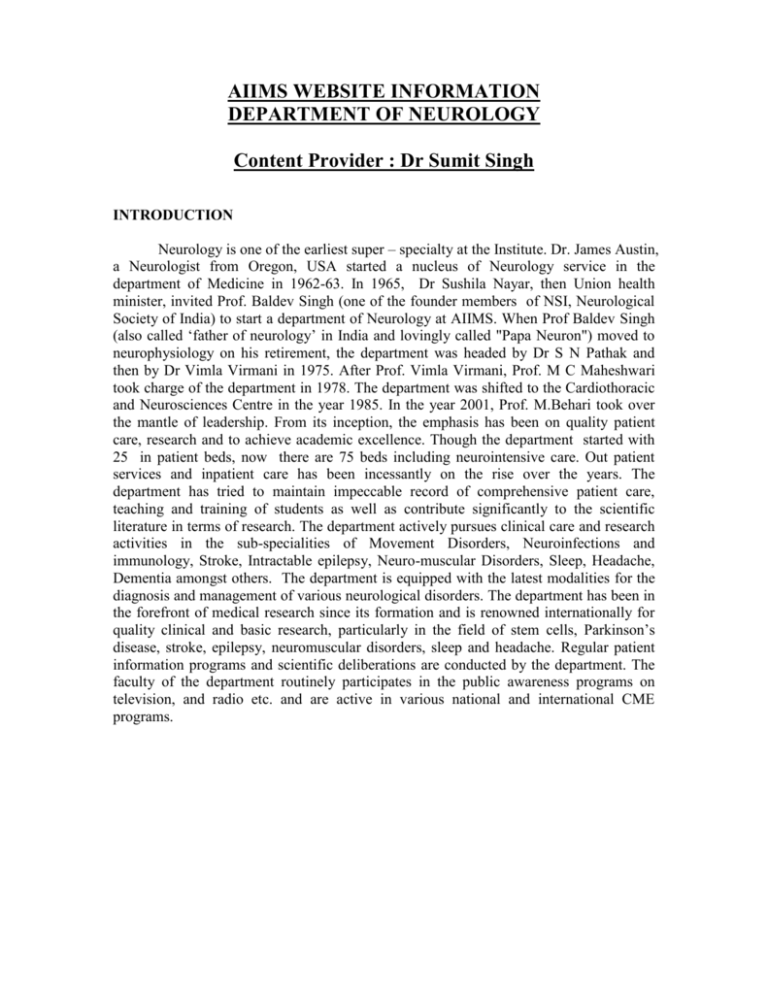
AIIMS WEBSITE INFORMATION DEPARTMENT OF NEUROLOGY Content Provider : Dr Sumit Singh INTRODUCTION Neurology is one of the earliest super – specialty at the Institute. Dr. James Austin, a Neurologist from Oregon, USA started a nucleus of Neurology service in the department of Medicine in 1962-63. In 1965, Dr Sushila Nayar, then Union health minister, invited Prof. Baldev Singh (one of the founder members of NSI, Neurological Society of India) to start a department of Neurology at AIIMS. When Prof Baldev Singh (also called ‘father of neurology’ in India and lovingly called "Papa Neuron") moved to neurophysiology on his retirement, the department was headed by Dr S N Pathak and then by Dr Vimla Virmani in 1975. After Prof. Vimla Virmani, Prof. M C Maheshwari took charge of the department in 1978. The department was shifted to the Cardiothoracic and Neurosciences Centre in the year 1985. In the year 2001, Prof. M.Behari took over the mantle of leadership. From its inception, the emphasis has been on quality patient care, research and to achieve academic excellence. Though the department started with 25 in patient beds, now there are 75 beds including neurointensive care. Out patient services and inpatient care has been incessantly on the rise over the years. The department has tried to maintain impeccable record of comprehensive patient care, teaching and training of students as well as contribute significantly to the scientific literature in terms of research. The department actively pursues clinical care and research activities in the sub-specialities of Movement Disorders, Neuroinfections and immunology, Stroke, Intractable epilepsy, Neuro-muscular Disorders, Sleep, Headache, Dementia amongst others. The department is equipped with the latest modalities for the diagnosis and management of various neurological disorders. The department has been in the forefront of medical research since its formation and is renowned internationally for quality clinical and basic research, particularly in the field of stem cells, Parkinson’s disease, stroke, epilepsy, neuromuscular disorders, sleep and headache. Regular patient information programs and scientific deliberations are conducted by the department. The faculty of the department routinely participates in the public awareness programs on television, and radio etc. and are active in various national and international CME programs. FACULTY Prof Madhuri Behari MBBS, MD, DM, FNAMS Head of the Department. Room No. 702, Department of Neurology, Neurosciences centre, AIIMS. Phone No. 0091-11-26594856, 26588886 Fax 0091- 11 -26588166. Email madhuribehari@hotmail.com Dr. Madhuri Behari joined the AIIMS as assistant professor in1984, after doing DM (neurology) from AIIMS and serving as assistant professor in GB Pant hospital for a brief period. Since then she has served the AIIMS in different capacities and has been heading the department since 2001. Her areas of research are movement disorders, neuroinfections, epilepsy and stem cells and have published more than 250 research articles and contributed chapters in books. She is the pioneer in the field of movement disorders in the country and was the first one to use botulinum toxin in the country for various movement disorders. She has guided several DM students and PhD students in their research. She is on board of academic council of several institutions of the country, task force member of ICMR and DBT and course committee of National Academy of Medical sciences. She is recipient of Commonwealth Medical Fellowship, Fellowship of International Federation of Clinical Electrophysiology and General Amir Chand Oration. She is currently the vice President of Delhi Neurological Association and Indian Academy of Neurology and will serve as President in 2007-2008. Important Publications 1) Behari M, Rao PS, Verma A. Attenuated Late Positivity in the visual evoked potential in aphasia induced by lesions in anterior speech area. Neuropsychobiology 25: 83 - 86; 1992. 2) Bain PG, Findley LJ, Atchison P, Behari M, Vidailhet M, Gresty M, Rothwell JC, Thompson PD, Marsden CD. Assessing tremor severity. J. Neurol. Neurosurg. Psychiatry 56: 868 - 873; 1993. 3) Behari M, Raju GB: Electrophysiological studies in patients with blepharospasm before and after botulinum toxin A therapy. Journ. Neuro.Sci. 135: 74-77; 1996. 4) Seth P, Ahuja GK, Vijay Bhanu N, Behari M, Bhowmik S, Broor S, Dar L, Chakraborty M. Evaluation of polymerase chain reaction for rapid diagnosis of clinically suspected tuberculous meningitis . Tubercle and Lung disease. 77: 353 357; 1996. 5) Denny AP, Behari M. Motor fluctuations in Parkinson’s disease. J. Neurol Sci 165: 18-23; 1999. 6) Deepak KK, Behari M. Specific muscle EMG biofeed back for hand dystonia. App. Psychophysiol Biofeed. 24(4): 267-280; 1999. 7) Behari M, Sharma AK, Changkakoti S, Sharma N, Pandey RM. Case-control study of Meige’s Syndrome – Result of a pilot study. Neuroepidemiology 19: 275-280; 2000. 8) Behari M, Srivastava AK, Das RR, Pandey RM. Risk factors of Parkinson’s disease in Indian patients. J.Neurol. Sci. 190(102):49-55;2001. 9) Kumar S, Bhatia M, Behari M; Sleep disorders in Parkinson's disease. Movement Disorders, 17 (4), 775-781, 2002. 10) Behari M. Experiences of Parkinson’s disease in India. The Lancet Neurology. Vol(4): 258-262; 2002. 11) Kumar S, Bhatia M. Behari M. Excessive daytime sleepiness in Parkinson’s disease as assessed by Epworth Sleepiness Scale (ESS). Sleep Medicine. 4(4): 339-42;2003. 12) Krishnan PR, Bhatia M, Behari M. Restless legs syndrome in Parkinson’s disease: A case Controlled study. Movement Disorders 18(2):181-5;2003. 13) Behari M, Srivastava AK, Pandey RM. Quality of life in patients with Parkinson's disease.Parkinsonism Relat Disord. 11(4):221-6;2005. 14) Chaudhary S, Behari M, Dihana M, Swaminath PV, Govindappa ST, Jayaram S,Goyal V, Maitra A, Muthane UB, Juyal RC, Thelma BK. Parkin mutations in familial and sporadic Parkinson's disease among Indians. Parkinsonism Relat Disord. May;12(4):239-45; 2006. Epub 2006 Feb 24. 15) Behari M, Singh KK, Seshadri S, Prasad K, Ahuja GK: Botulinum toxin A in blepharospasm and hemifacial spasm. Jour. Assoc. Phys. India 42: 205 - 207; 1994. Prof Kameshwar Prasad, MBBS, MD, DM, M MSc. Room No. 704, Department of Neurology, Neurosciences Centre, AIIMS. Phone no. 0091-11-26593497. Email drkameshwarprasad@yahoo.co.in Prof Kameshwar Prasad completed his MD in 1983 and DM in 1985 from AIIMS, New Delhi after being awarded the ‘Best Medical Graduate of the year’ at Rajendra Medical College. He has also obtained the degree of Master of Science in Clinical Epidemiology and Health Research Methodology, McMaster University, Canada, 1993. His area of interest include clinical neurology, Stroke, Evidence-Based Medicine, Clinical Trials, Meta-Analysis, Medical Education, & Clinical Epidemiology. He is an Editor, Edinburgh-based Cochrane Stroke Group and was the National Coordinator of International Stroke Trial 1&3, and ENOS in India. He is a member of the Editorial Board of “Practical Neurology” and also has an additional responsibility as the Director, Clinical Epidemiology Unit, AIIMS, New Delhi. He has served as the Founder Former Chairman of Department of Clinical Neurosciences, Ministry of Health, Bahrain and is a member of McMaster-based International Evidence-Based Medicine Working Group. He was chosen as an editor of Cochrane ARI Group (two terms) and is a referee for many national & international journals including BMJ. For his excellence in the field of neurology he was awarded a civilian honour “Padmashree” by the Hon’ble President of India in the year 1992. Apart from his scientific publications in international journals he has authored one book “Fundamentals of Evidence-Based Medicine” of which he is the sole author. Important Publications Journal Articles: 1. Prasad K, Al-Roomi K, Krishnan PR, Sequeira R. Anticonvulsant therapy for status epilepticus. Cochrane Database Syst Rev 2005;CD003723. 2. Prasad K, Singhal T, Jain N, Gupta PK. Third generation cephalosporins versus conventional antibiotics for treating acute bacterial meningitis (Cochrane Review). In: The Cochrane Library, Issue 2, 2004. Chichester, UK: John Wiley & Sons, Ltd. 3. Prasad K., Al-Roomi K., Sequira R. Anticonvulsant therapy for status epileptiocus (Protocol for a Cochrane Review). In: The Cochrane Library, Issue 3, 2002. Oxford: Update Software. 4. Prasad K. Steroids in cerebral malaria (Cochrane Review). In: The Cochrane Library, Issue 3, 1998. Oxford: Update Software. 5. Prasad K, Menon GR. Steroids in tuberculous meningitis (Cochrane Review). In: The Cochrane Library, Issue 3, 1998. Oxford: Update Software. 6. Prasad K, Menon Geetha R. Comparison of the three strategies of verbal scoring of the Glasgow Coma Scale in patients with stroke. Cerebrovasc Dis 1998;8:79-85. 7. Prasad K, Browman G, Shrivastava A, Menon Geetha. Surgery in primary supratentorial intracerebral hematoma: a meta-analysis of randomised trials. Acta Neurologica Scandinavica 1997;95:103-110. 8. Prasad K. Stroke in young (Editorial). The National Medical Journal of India 1997;10:3-4. 9. Prasad K. Tuberculous meningitis: A review of the Indian Experience. Neurosciences Update 1997;1:27-34. 10. Prasad K. The Glasgow Coma Scale : A critical appraisal of its clinimetric properties. J Clin Epid 1996: 49: 755-763. 11. Prasad K, Haines T. Dexamethasone therapy in acute bacterial meningitis: how strong is the evidence for routine use? J Neurol Neurosurg Psych 1995; 59: 31-37. 12. Prasad K. Medical Education in ambulatory care settings. J Acad Hosp Admn 1990;2:33-36. 13. Prasad K. Cost-containment issues in speciality services J Acad Hosp Admn 1989;1:62-64. 14. Prasad K, Browman G, Shrivastava A, Menon GR. Role of surgery in the management of primary supratentorial intracerebral haemorrhage; a meta-analytic study. Cerebrovas Dis 1995;5:234. 15. Prasad K. Reliability and validity of exudate score as an independent predictor of outcome in patients with tuberculous meningitis. J Clin Epid. 1997;50(1):88. Prof M V Padma, MBBS, MD, DM. Room No 709, Departmetnt of Neurology, Neurosciences Centre, AIIMS, Phone/Fax 0091-11-26594794 Email vasanthapadma123@rediffmail.com Dr Padma has a primary area of interest in stroke. She initiated the thrombolysis program for acute ischemic stroke at AIIMS. christened “Code-Red”, with tissue plasminogen activator, AIIMS being the first public sector hospital to launch this program. She is also an active and founding member of the Comprehensive Epilepsy Program at AIIMS including the Epilepsy Surgery and Intractable Epilepsy Clinic. Dr Padma has organized national and international CMEs and Symposia including the recently concluded Indo-US Symposium on Cerebrovascular Disorders. Presently she is working on projects like Human autologous stem cell therapy in Stroke; and in Cerebral palsy, which are funded by the National scientific bodies such as Directorate of Science and Technology and Directorate of Biotechnology. She is a part of the STICH trial and IST-3 and has been working on association and outcomes of Hyperhomosyteinemia in stroke, lipid profile and association with stroke and stroke subtypes; risk factor profile of stroke in India with special reference to stroke in young etc. She is the national coordinator for the SITS-MOST registry for thrombolysis for stroke data from India and a member of the National Stroke Surveillance program for India. Important Publications 1. Padma MV, Behari M, Mishra NK, Ahuja GK.Albendazole in single CT ring lesions in epilepsy. NEUROLOGY Vol. 44: No. 7: 1344-1346; 1994. 2.Padma MV, Behari M, Mishra NK, Ahuja GK.Albendazole in Neurocysticercosis. THE NATIONAL MEDICAL JOURN. OF INDIA. Vol. 8: No. 6: 255-257; 1995. 3. Padma MV, Gaekwad SB, Jain S, Mishra NK, Maheshwari MC. Distribution of vascular lesions in ischemic stroke: A Magnetic Resonance Angiographic study. NATIONAL MEDICAL JOURNAL OF INDIA.Vol. 10: 217-220; 1997. 4. Padma MV, Bajaj JS. Diabetes and Stroke. ICP STROKE MONOGRAM(eds) Bansal et al.pp 79 – 76; 1999. 5. Jain S, Padma MV, Kanga U, Puri A, Mehra NK, Maheshwari MC. HLA studies in Indian probands with seizures associated with single small enhancing CT lesions and types in their family members.JOURNAL OF EPILEPSY Vol. 10: 55-61; 1997. 6. M.V.Padma, S. Said, M. Jacobs, D. R. Dwang, K. Dunigan, B. Christian, M. Satter, T.Berinsten, G. Krauss, J. Rupert, J. Mantil. Prediction of Pathology and survival by 18F – FDG PET in Gliomas. JOURNAL OF NEURO-ONCOLOGY, 64(3): 227-237, 2003. 7. MV.Padma, R. Simkins, P. White, B. Christian, M. Satter, K. Dunigan, C.Lee, J. Clinical utility of 11 – C – Flumazenil PET in Intractable Temporal Lobe Epilepsy. NEUROLOGY INDIA. 8. Jain S, Padma MV, Puri A, Jyoti, Maheshwari MC. Occurrence of epilepsies in family members of Indian probands with different Epileptic syndromes.EPILEPSIA. Vol. 38 (2): 237- 244; 1997. 9. Jain S, Padma MV, Kanga U, Mehra NK, Maheshwari MC. Family studies and Human Leukocyte Antigen Class II Typing in Indian Probands with Single Small Enhancing Computed Tomography Lesions. EPILEPSIA. 40(2): 232-238; 1999. 10. Padma MV, Majaz M, Fisher M. Thrombolytic therapy for acute ischemic stroke: 3 hours and beyond. Expert rev. Neurotherapeutics, 5 (2): 223 – 233, 2005. 11.Padma MV, Fisher M, Mazaz M. Critical assessment of medications for risk reduction of first and recurrent ischemic stroke. Expert rev. Cardiovasc. Ther 2 (6): 867 – 876, 2004. 12.Padma V, Fisher M, Moonis M. Role of heparin and low-molecular-weight heparins in the management of acute ischemic stroke. Expert rev. Cardiovasc. Ther. 4(3): 405-415; 2006. 13. Padma MV, Singh MB, Bhatia R, Srivastava A, Tripathi M, Shukla G, Goyal V, Singh S, Prasad K, Behari M. Hyperacute thrombolysis with IV rtPA of acute ischemic stroke: Efficacy and safety profile of 54 patients at a tertiary referral center in a developing country. Neurol India. 2007 Mar;55(1):46-9. Dr Manjari tripathi MBBS, MD, DM Associate Professor, Room No 705, Department of Neurology, Neurosciences Centre, AIIMS. Phone No. 0091-11-26594494. Email manjari.tripathi@gmail.com Dr Manjari did her DM Neurology at NIMHANS, Bangalore in the year 1996. Worked as Faculty Neurology St Johns Medical College Bangalore 1997-1998, Joined AIIMS as an Assistant Professor Neurology in 1998. She did her fellowship in epilepsy at the prestigious University College of Los Angeles (UCLA) – USA under the mentorship of Prof J Engel (Seizure Disorder center UCLA). She did a rotation in Sleep medicine under the supervision of Prof Frica Yan Go (UCLA) April 2006. Completed NIH course on introductions to principles and practice of clinical research in 2005. Observed at veterans affairs hospital Dementia clinic. Observed functioning of Dementia clinic with Prof M Mesulam Northwestern University, Chicago, USA in 2002. She is a member of Professional societies American Academy of Neurology, Indian epilepsy Society, 10/66 Dementia research group, Epilepsy and disability workgroup, member tropical neurology subsection of Indian academy of neurology, Indian Academy of Neurology, Indian academy of Sleep Medicine, Alzheimer’s society of India, and American epilepsy society. Has numerous research publications in epilepsy, dementia, multiple sclerosis, headache etc. Has research projects in Epilepsy and dementia and guides residents in Neurology and Phd students with there thesis and research work. Is interested in Epilepsies especially Intractable epilepsies, Women with epilepsy and functional neuroimaging in Epilepsy. Is interested in the use of implantable devices in epilepsy, spasticity and pain. Has an interest in Cognitive disorders specially Dementias; Childhood acquired aphasias, reversible cognitive decline. Sleep and Multiple sclerosis and other immune mediated neurological disorders and has a keen interest in tropical neurology. She is an integral part of the comprehensive epilepsy care program and runs an intractable epilepsy clinic apart from a cognitive disorders clinic. Important Publications 1. Tripathi M, Padma MV, Singh M, Srivastava A, Gupta A, Sarkar C, Bal CS, Gaikwad S, Shukla G, Jain S, Bhatia M, Singh VP, Chandra PS. Epilepsy surgery program in India : Developing and maintaining it? A developing country perspective- An experience of 354 cases. In press ( Epilepsy and Behaiviour) 2. Tripathi M, Jain S. Genetics in epilepsy: transcultural perspectives. Epilepsia. 2003;44 Suppl 1:12-6. 3. Tripathi M, Sheshadri S, Padma MV, Jain S, Meheshwari MC, Behari M. Serum cobalamin levels in dementias. Neurol India. 2001 Sep;49(3):284-6. 4. Kumar A, Tripathi M, Pandey RM, Ramakrishnan L, Srinivas M, Luthra K. Apolipoprotein E in temporal lobe epilepsy: a case-control study. Dis Markers. 2006;22(5-6):335-42. 5. Panda S, Tripathi M Clinical profile of migraineurs in a referral centre in India. J Assoc Physicians India. 2005 Feb;53:111-5. 6. Sanyal SK, Chandra PS, Gupta S, Tripathi M, Singh VP, Jain S, Padma MV, Mehta VS. Memory and intelligence outcome following surgery for intractable temporal lobe epilepsy: relationship to seizure outcome and evaluation using a customized neuropsychological battery. Epilepsy Behav. 2005 Mar;6(2):147-55. 7. Jain S, Bhatia M, Tripathi M, Srivastava A, Padma MV, Pandey RM. Seizures among families of Indian probands with different epileptic syndromes. Acta Neurol Scand. 2004 Jul;110(1):27-38. 8. Pradeep Kumar VG, Bhatia M, Tripathi M, Srivastava AK, Jain S. Obstructive sleep apnoea: a case-control study. Neurol India. 2003 Dec;51(4):497-9. 9. Luthra K, Tripathi M, Grover R, Dwivedi M, Kumar A, Dey AB. apolipoprotein E gene polymorphism in Indian patients with Alzheimer's disease and vascular dementia. Dement Geriatr Cogn Disord. 2004;17(3):132-5. Epub 2004 Jan 20. 10. Kumar VG, Bhatia M, Tripathi M, Srivastava AK, Jain S. Restless legs syndrome: diagnosis and treatment.J Assoc Physicians India. 2003 Aug;51:782-3. 11. Krishnan PR, Tripathi M, Jain S. Seizure worsening with topiramate amongst Indians with refractory epilepsy. Eur J Neurol. 2003 Sep;10(5):515-9. 12. Jain S, Tripathi M, Srivastava AK, Narula A. Phenotypic analysis of juvenile myoclonic epilepsy in Indian families. Acta Neurol Scand. 2003 May;107(5):35662. Dr Sumit Singh MBBS, MD, DM Associate Professor, Room No. 707, Department of Neurology Neurosciences Centre, AIIMS. Phone No – 0091-11-26588700 Extn 3491. Email singh_sumit@hotmail.com A topper in the DM neurology examination of AIIMS, Dr Sumit Singh is interested in Neuromuscular disorders and headache. He received training in muscle disorders in Institut de Myologie Sal Patriare hospital, Paris France and initiated the Neuromuscular disorder clinic at AIIMS neurology in the year 2000 and is actively involved in clinical research on Neuromuscular disorders. He has completed two projects on the subject involving the therapeutic efficacy of autologus bone marrow stem cells in muscular dystrophies, and in Motor neuron disease. He organized the first international conference on neuromuscular disorders in India, and is a member of the ICMR task force on Neuromuscular disorders. He initiated and standardized the plasma exchange procedure and protocol in the department, and organized the videoscopically assisted thymectomy as a standard procedure for the patients with myasthenia gravis in collaboration with the surgery unit. He is a reviewer of the Cochrane database of systematic reviews, neuromuscular subsection. He initiated the headache clinic in the neurology OPD in the year 2003 and started the use of botulinum toxin in migraine, tension type headache and trigeminal neuralgia, for the first time in north India. He is an important component of the movement disorders group of AIIMS is the general secretary of PRAN – a NGO formed for spreading awareness on Parkinson’s disease. He is a recipient of various awards and medals and has been a visiting faculty to Nepal and in various colleges of Uttar Pradesh. He is a member of the International headache society, Neuromuscualr disoders society of Europe, Movement disorders society , and the Indian academy of Neurology. Important Publications Chapter in Books 1. PARASITIC INFECTIONS OF THE NERVOUS SYSTEM Behari M , Singh S. In Neurology in clinical practice Bradley WG, Darrof RB, Fenichel GM, Marsden CD, eds. Fourth edition. Butterworth Heinmann,s pub. 2004 USA.205187. Journals 1. Singh S, SHukla I, Goyal V, Behari M, Bhasin R, Daily versus alternate day plasma exchange for patients with severe myasthenia, Accepted for publication in J. Neurology. 2. Singh S, Gupta P, Goyal V, Shukla G, Behari M, Low Dose Topiramate versus Lamotrigine for the prophylaxix for migraine. Accepted for p[ublication in Headache. 3. Singh S, Behari M. Verbal and visual memory in patients with early Parkinson's disease: effect of levodopa. Neurol India. 2006 Mar;54(1):33-7. 4. Wilson’s disease – Singh S, Behari M. JAPI Vol 51.Feb 2003 5. Cervical dystonia responsive to levodopa Singh S, Goyal V, Prasad K, Behari M. – letter to editorial – Neurology India June 2004Vol52Issue 2.276-278. 6. Fungal granuloma of the brain caused by Cladosporium bantianum – a case report and the review of literature – Singh S, Singh P, Goyal V, Srivastava T, Shukla G, 7. Wilson’s Disease Singh S, Behari M. Selected topics in Movement disorders – An update. Ed. Kalyan B Bhattacharya. 2000; 137-150. 8. Spasmodic dysphonia – a review – Singh S, Behari M. ORL Delhi 1(3) 359. Gupta E, Dar L, Singh S, Behari M, Broor S. Role of CSF serology in follow-up of subacute sclerosing panencephalitis patients on treatment. Indian J Med Microbiol. 2006 Apr;24(2):131-2. 10. Physician Assisted Suicide- the perspective of a neurologist .Singh S, Behari M, Prasad K, SardanaV JAPI., Aug 2001(49):823-838. 11. Video Assisted thymectomy in patients with Jeuvenile Myasthenia gravis. AIIMS experience Arvind Kumar, Kumar S, Singh S, Dilip K, Kalara V Indian Pediatrics 2002 Dec; 39(12) 1131-7. 12. Isolated "one and a half syndrome" with brainstem tuberculoma. Menon V, Gogoi M, Saxena R, Singh S, Kumar A. Indian J Pediatr. 2004 May;71(5):469-71. 13. Primary AL (Kappa light chain) amyloidosis manifesting as peripheral neuropathy in a young male without increase in serum and urine immunoglobulin load : a diagnostic challenge. Sarkar C, Sharma MC, Nayak A, Gupta V, Singh S, Behari M. Clin Neuropathology 2005, May June 24(3) 118-25. 14. Desmin related myopathy : report of a rare case Sridhar E, Sharma MC, Singh S, Sarkar C. Neurol India 2005 Apr – Jun 53 (2) 229-31. 15. Unusual MRI findings in Young onset Parkinson’s disease K.S.Anand, A Prasad A biswas Singh S Case report Neurology India 1997 (44) 4. Dr Vinay Goyal MBBS, MD, DM Associate Professor, Room No. 706 Department of Neurology Neurosciences Centre, AIIMS. Phone No – 0091-11-26588700 Extn 3491. 0091-11-26594210 drvianygoyal@hotmail.com Dr Viany Goyal’s areas of interest are movement disorders and neuroinfectious diseases. He is actively involved in injecting Botulinum toxin in spasticity and various dystonias with special interest in spasmodic dysphonia. He has been trained in Intrathecal baclofen pump program (European Continuing Medical Training) at Oslo, Norway, and is regularly monitoring the Function and installation of baclofen pumps in patients with spasticity. Dr Vinay has undergone training at Kings college London for Deep Brain Stimulation Surgery in various movement disorders and has been actively involved in the installation of DBS in these patients. He has been trained in specialized neuro-muscular disorders at program organized by Institute of Myologie, AFM, Paris, France and has been doing Plasma-pharesis in various neurological disorders. He has special interest in Entrapment neuropathies (especially carpal tunnel syndrome) and its management and has been involved in Stem cell therapy trial in Acute ischemic stroke. Important Publications 1. Goyal V, Sood R. Raised intracranial pressure. In Emergency Medicine, ed. Agrawal AK, Jaypee brothers publications Ltd, New Delhi, 2005: 318-326 2. Prasad K, Goyal V. “Neurological practice- An Indian Perspective” ed. Wadia NH. Elsevier publication, New Delhi 2005: 309-335 3. Goyal V, Garg A. Management of Parkinson’s disease. CME 2005 book, East Delhi Physicians Association. 2005: 55-57 4. Goyal V, Tripathi M. Sunflower cataract in Wilson’s disease. J Neurol Neurosurg Psychiatry.2000, 69: 133 5. Goyal V, Tripathi. Stroke and intravenous immunoglobin. Neurology Asia 2005; 10: 125-26 6. Goyal V, Bordia A. Hypoglycemic effect of chloroquine. J Assoc Physicians Ind. 1995, 43(1): 17-18 7. Goyal V, Behari M. Botulinum Toxin in Hemifacial Spasm. J Assoc Physicians Ind. 1998, 46(12): 1021-23 8. Behari M, Goyal V. Botulinum Toxin A: From toxin to therapeutic agent (Review Article). J Assoc Physicians Ind. 2000, 48: 225-33 9. Goyal V. Hypoglycemic complication of quinine. (Letter to Editor). J Assoc Physicians Ind. 2000, 48: 259 10. Goyal V, Bhatia M, Padma MV, Jain S, Maheshawari MC. Electrophysiological evaluation of 140 hands with carpal tunnel syndrome. J Assoc Physicians Ind 2001, 49: 1070-73 11. Goyal V, Behari M. Dystonia as presenting manifestation of ataxia telangiectasia: A case report. Neurol Ind 2002; 50; 187-189 12. Goyal V, Bhatia, Behari M. Carpal tunnel syndrome after 22 years of Colle’s fracture. Short communication. Neurol Ind 2003: 51: 113-14 13. Goyal V, Misra B, Singh S, Prasad K, Behari M. Acute inflammatory demyelinating polyneuropathy (AIDP) in patients with pregnancy. Neurol Ind 2004; 52: 283-84 14. Goyal V, Bhatia M, Behari M. Increased depressant effect of phenytoin sodium as compared to carbamazepine on cortical excitability: A transcranial magnetic evaluation. Neurol Ind 2004; 52: 224-27 15. Panda S, Goyal V, Gupta V, Singh S, Srivastava T, Padma MV, Behari M. Vertebrobasilar dolichoectasia presenting as lower cranial nerve palsy: A case report. Neurol Ind 2004; 52: 279-80 16. Panda S, Goyal V, Singh S, Srivastava T, Behari M. Myasthenic crisis: A retrospective study. Neurol Ind 2004; 52: 453-56 Dr Achal Srivasrtava, MBBS, MD, DM Associate Professor, In charge Clinical electrophysiology Unit, Room No 50 Ground Floor, Neurosciences Centre, AIIMS Phone No. 26588700 extn 3491, 4309. achalsrivastava@hotmail.com Dr Garima Shukla MBBS, MD, DM Associate Professor, Room No. 706, Department of Neurology Neurosciences Centre, AIIMS. Phone No – 0091-11-26588700 Extn 4210 drgarimashukla@hotmail.com Dr Garima Shukla has been an outstanding student in her medical career, and after doing her masters in Neurology from the institute she has pursued her active interest in epilepsy and sleep medicine. She has been an integral part of the epilepsy surgery program at the AIIMS for the last four years and runs the Intractable epilepsy clinic. She has been involved in several research projects in intractable epilepsy. Dr Garima described a new clinical sign “unidirectional whole body turning” which has been found to be of lateralizing value in complex partial seizures. She has attended and presented paper at several national and international epilepsy conferences and received awards for best paper at the Annual conferences of the Indian Epilespy Society and Indian Epilepsy Association, 2003 and 2005. She delivered the All India Institute of Medical Sciences Golden Jubilee Public lecture on ‘Epilepsy’ on the 8th September ’06. She is a member, Executive Committee of the Indian Epilepsy Society and a regular reviewer for the journal ‘Epilepsia’. She is also managing the Sleep disorders Clinic since 2001, where an average of 200 patients with different types of sleep disorders are managed annually. Organized the first international symposium endorsed by the World Association of Sleep Medicine, in February 2005, at New Delhi. She has delivered guest lectures at various sleep and epilepsy conferences at national and international levels and made platform presentations at international sleep conferences. She is a member, editorial board of the Indian Journal of Sleep Medicine, the official journal of the Indian Sleep disorders Association and was the recipient of the “Young Investigator Award” for paper presented at the World Association of Sleep Medicine, 2nd Congress, at Bangkok, Thailand, February 2007. She has also received various awards in clinical neurophysiology, epilepsy and sleep medicine. Important Publications 1. G. Shukla, P.S. Deol, R. Arora, K. Prasad, M. Behari. ‘Isolated angiitis of the Central nervous system – Report of a patient with an unusually prolonged course’. European Neurology 2001; 46:162-163. 2. G. Shukla, M.Bhatia, SB Gaikwad, VP Singh, S. Jain, MC Maheshwari. ‘The Lateralizing significance of version of head and dystonic limb posturing in epileptic Seizures’. Neurology India 2002; 50:33-36. 3. Shukla G, Bhatia M., Behari M. Peripheral silent periods in essential tremor. Journal of the Neurological Sciences 2002; 199(1-2): 55-58. 4. G. Shukla, M. Bhatia, RM Pandey, M. Behari. 'Cortical silent periods in Essential Tremor'. Electromyogr Clin Neurophysiol. 2003 Sep;43(6):329-331. 5. Lazarus JP, Bhatia M, Shukla G, Padma MV, Tripathi M, Srivastava AK, Singh MB, Sagar R, Jain S. A study of nonepileptic seizures in an Indian population. Epilepsy Behav. 2003 Oct; 4(5): 496-9. 6. Shukla G, Bhatia M, Singh VP, Jaiswal A, Tripathi M, Gaikwad S, Bal CS, Sarkar C, Jain S. Successful selection of patients with intractable extratemporal epilepsy using non-invasive investigations. Seizure. 2003 Dec;12(8):573-6. 7. Shukla G, Bhatia M, Vivekanandhan S, Gupta N, Tripathi M, Srivastava A, Pandey RM, Jain S. Serum prolactin levels for differentiation of nonepileptic versus true seizures: limited utility. Epilepsy Behav. 2004 Aug;5(4):517-21. 8. Shukla G, Behari M. A clinical study of non-parkinsonian and non-cerebellar tremor at a specialty movement disorders clinic. Neurol India. 2004 Jun;52(2):200-2. 9. Shukla G, Bhatia M, Sarkar C, Padma MV, Tripathi M, Jain S. Muscular dystrophies and related skeletal muscle disorders in an Indian population - a prospective correlative study. J Clin Neurosci. 2004 Sep;11(7):723-7. 10. Srivastava T, Singh S, Goyal V, Shukla G, Behari M. "Hot cross bun" sign in two patients with multiple system atrophy-cerebellar. Neurology. 2005 Jan 11;64(1):128. 11. Khandelwal D, Bhatia M, Singh S, Shukla G, Goyal V, Behari M. Threshold intensity and central motor conduction time in patients with monomelic amyotrophy: a transcranial magnetic stimulation evaluation. Electromyogr Clin Neurophysiol. 2004 Sep;44(6):357-60. 12. Garima Shukla , Manvir Bhatia, Madhuri Behari. Quantitative thermal sensory testing — value of testing for both cold and warm sensation detection in evaluation of small fiber neuropathy. Clinical Neurology and Neurosurgery, 2005;107(6):486-490. 13. Garima Shukla, Manvir Bhatia, MV Padma, Manjari Tripathi, Achal Srivastava, VP Singh, P Saratchandra, Aditya Gupta, Shailesh Gaikwad, CS Bal, Satish Jain. Unidirectional whole body turning – a new lateralizing sign in complex partial seizures. J. Neurol. Neurosurg. Psychiatry 2005;76;1726-1729. 14. G Shukla, M Bhatia, MVP Srivastava, M Tripathi , A Srivastava, MB Singh, M Behari. Minisphenoidal Electrode Recording In Temporal Lobe Complex Partial Seizures – Utility In Comparison With Anterior Temporal Electrodes. (Abstract) Epilepsia 2005;46(Suppl 6)219. Dr Rohit Bhatia MBBS, MD, DM Assistant Professor, Room No. 710, Department of Neurology Neurosciences Centre, AIIMS. Phone no. 0091-11- 26594856 rohitbhatia71@yahoo.co.in Dr Rohit graduated from Govt Medical College Patiala in the year 1992 , followed by internship of one year from the same place. Thereafter he did his MD in medicine from Govt Medical College Amritsar from 1995 to 1998. He joined DM in neurology at PGIMER Chandigarh in January 1999 and completed the same in Dec 2001. He worked as a research associate in the dept of neurology at PGIMER, between January 2002 to June 2002 and later joined as Assistant Professor in neurology at PGIMER Chandigarh in July 2002. He eventually joined as Assistant Professor in neurology in June 2003 at AIIMS. His fields of interest include stroke and neuromuscular disease with special reference to critical care, diagnosis and treatment; infections, headache, neuroophthalmology, demyelinating disorders. Important Publications 1. S.Prabhakar, R.Bhatia. Diagnosis of Cruetzfeldt Jacob Disease. Neurology India. 2001; 49 : 325 328. 2. Prabhakar S, Bhatia R, Khandelwal N, Lal V, Das CP. Vertebral artery dissection due to indirect neck trauma : an underrecognised entity. Neurology India 2001 ; 49 : 384 -390. 3. Prabhakar S, Bhatia R, Lal V, Singh P. Hypertrophic pachymeningitis: varied manifestations of a single disease entity. Neurology India 2002 ; 50 : 45 – 52. 4. Bhatia R, Prabhakar S, Grover VK. Tetanus. Neurol India. 2002 Dec;50:398407. 5. R.Bhatia . Cell transplantation in Ischemic Stroke. In : Padma MV, Mehnidiratta M M . ( Eds ). Frontiers in Stroke Management. Released in Indian Academy of Neurology Annual Conference. Vishakapatnam October 2003. 6. R.Bhatia, S.Prabhakar, D.Shedde, S.Gopalan, P.Sahota, R.Shukla. Coexistent cranial tuberculomas and tuberculosis of the cervix in a postmenopausal woman. Sexually Transmitted Infections 2003 ; (Dec) 79 : 496 - 497 7. S.Prabhakar, R.Bhatia. Management of agitation and convulsions in hepatic encephalopathy. Proceedings of Single Theme Conference on Hepatic Encephalopthy, PGIMER 2000. Indian Journal of Gastroenterology. 2003;Dec ( 22 ) supplement 2 : S 54 - 58 8. R.Bhatia, S.Prabhakar, V.Lal, D.Khurana, C.P.Das. Acute Onset Paraneoplastic cerebellar degeneration. Neurology India 2003 ;( april –june ) 51 : 244 -245 9. R.Bhatia, F.Chacko. Guillaine Barre Syndrome. Current Medical Journal of North Zone 2003 ; April Vol 9 ( 1 ) : 37 – 42 10. M. Modi, R. Bhatia, R. Jain, V. Lal, B. D. Radotra, A. Aggarwal : Uncommon manifestations of neurosarcoidosis. Neurology India 2004. 11. R.Bhatia, A.Garg. Diffusion abnormality detects a acute demyelinating lesion in probable multiple sclerosis. Under Print in Indian J of Radiology and Imaging. Jan -march Issue 2007. 12. R.Bhatia, S.Prabhakar, M.Modi, V.Lal, J.Laldinpuii. Isolated slowly evolving oculomotor nerve palsy due to a solitary midbrain metastasis. Annals of Indian academy of neurology 2003; vol 6. no.3 (Abstract) 13. R.Bhatia, D.Soni, Padma MV, Tripathi M, Srivastava A. Singh MB, Are risk factors for stroke coomon in first degree relatives and spouses of stroke patients? J. Clinical Neuroscience, Vol11, Supplement 1, 2004, S39 (Abstract) 14. Bhatia R , Garg J, Tripathi M, Shukla G, Prasad K, Padma MV, Singh MB, Srivatava A,. Aetiological spectrum of chronic peripheral neuropathy in India: a prospective clinicoelectrophysiological study in 212 patients. Journal of the Neurological Sciences. 2005; 238 ( suppl 1 ) : S97 (Abstract) 15. Bhatia R , Prasad K, Padma MV, , Singh MB, Kumar R, Tripathi M, Srivatava A. Oculomotor palsy due to midbrain granulomas : nuclear , fascicular or mixed. Journal of the Neurological Sciences. 2005; 238 (suppl 1 ) : S 332 (Abstract). Dr Mamta Bhushan Singh MBBS, MD, DM Assistant Professor, Clinical electrophysiology Unit, Room No 50 Ground Floor, Neurosciences Centre, AIIMS Phone No. 26588700 extn 3491, 4309. Email mbsneuro@gmail.com Dr Mamta Bhusan Singh joined the faculty of AIIMS neurology department in the year 2002. She is co-incharge of the clinical electrophysiology unit of Neurology department and has a keen interest in Sleep medicine and Epilepsy. Important Publications 1. Pradhan S, Gupta. RK, Singh MB, Mathur A. Biphasic illness pattern due to early relapse in Japanese – B virus encephalities. J Neurol Sciences 2001; 183: 19-26. 2. Singh MB, Kalita J, Misra UK. Landau Kleffner Syndrome: Electroclinical and Etiopathogenic Heterogeneity. Neurol India 2002; 50 : 417-423. 3. Lazarus JP, Bhatia M, Shukla G, Padma MV, Tripathi M, Shrivastava A, Singh MB, Sagar R, Jain S. A Study of Non-epileptic Seizures in an Indian Population. Epilepsy & Behaviour 4 ( 2003 ) 496-499 4. Jayantee Kalita, Mamta B.Singh, Usha K.Misra, Birendra K.Das. LandauKleffner syndrome evolving to electrical status epilepticus : a case report illustrating clinical heterogeniety. Journal of Pediatric Neurology 2004;2 (3): 157160 5. Singh MB, Tripathi M, Padma MV, Shukla G, Srivastava A, Prasad K, Behari M, Bhatia R, Bhatia M, Gaikwad SB. Concordance between Interictal EEG / Lesion and Ictal Video EEG / Lesion : As Predictors of Outcome of Epilepsy Surgery Abstract Book 13th Annual Conference of Indian Academy of Neurology, Jaipur, India. Sept 23-25, 2005. STAFF NAME Mr Raghuvansh Sharma. DESIGNATION Principal Private Secretary to the HOD Neurology Mrs Kamla Mr Radhey Shiam Stenographer with The HOD Neurology LDC (Ad - hoc) Mr Sapan, Attendent Mr Lalit Saraswat LDC Mr Sunderlala Tanwar Mr Tajinder Dhiana LDC (Ad Hoc) Data entry operator (Under Project) Lab Attendent Mr Brijesh Kumar Mr Kamal Gulati Mr Anupam Kumar Mr. Amit Kumar Mr. Rohit Kumar Mr Virender Bisht Mr Dev Stenographer with Prof. Kameshwar Prasad Data entry operator with Dr K. Prasad. Project assistant with Prof K Prasad Field investigator with Prof K Prasad. Project assistant with Prof MV Padma Field Worker COURSES S.No 1. 2. 3. 4. 5. 6. 7. 8. 9. 10. 11. 12. 13. 14. 15. 16. 17. 18. 19. 20. 21. 22. Name of the Student Vibhor Pardasani Sachin P Birender Paul Ravi yadav Soham Desai Rajesh S Srijitesh Kapil Kumar Alok Verma Pawan Singh Uma Padi Deepti Vibha Mukesh Kumar Nirender kumar C. Soundarya rajan Chanchal Goyal Hamid Suhail Saima Naz Siddiqi Ashima Katara Hardeep Gambhir Mohit Saxena Ms Neha Karlupia Year of Admission July 2004 - do - do July 2005 - do - do January 2006 - do - do - do July 2006 - do January 2007 - do July 2001 January 2003 July 2004 July 2004 February 2005 Feb 2005 January 2007 Junior Research fellow Course Enrolled DM Neurology - do - do - do - do - do - do - do - do - do - do - do - do - do PhD - do - do - do - do - do - do JRF For entry into the DM and PhD courses the students can gather information from the website and the advertisements in the leading news Papers. The DM courses are three year courses and the entrance examination are conducted on an yearly or twice yearly basis depending on the number of seats. TRAINING The Department does not offer any special training apart from the DM courses, and the PhD Programs. Students from various teaching institutions outside and within India can apply for observer ship in the department through the academic section. OPD Services. The department caters to Out patients daily except on Sundays. The OPD timings are from 09.00 AM in the morning to 1.00 PM in the afternoon. The Patients have to register themselves in the Neurology OPD by paying a nominal registration fees of Rs. 10 only (valid for one year). The registration timings are from 0830 hrs to 1030 hrs every day. The registration counters are separate for pre-registered and new patients and the patients should try to queue for the respective counters only, to avoid confusion. The OPD registration is possible only for patients who are referred for a neurology consultation to AIIMS, and the patients are not encouraged for a direct consultation at the OPD. Prior appointments can be taken in person from Room No 6 in the OPD from 1000 hrs to 1300 hrs and thereafter from the Neurology Office (Room No 703, phone number 0091-11-26588700 Extn 3252) from 1400 hrs to 1700 hrs in person or by telephone, for taking consultation from any of the consultants. The patients who have taken prior appointments have the facility of a separate counter for registration at the OPD, and they are given priority over the patients who do not have an appointment in terms of waiting time. Sincere efforts are made to attend to the patients at their appointed time, however they should be prepared to wait for a few hours and attempt to be patient. The OPD also has a separate counter for registration of the senior citizens. The department also conducts specialty clinics for specific neurological disorders on particular days (as shown below). Routine patients, (not registered in these clinics) are not usually seen in these clinics OPD SHEDULE OPD timings 0900 AM to 0100 PM Registration timings 0830 AM to 1030 AM UNIT I OPD Monday and Friday. Consultants Prof Kameshwar Prasad Prof MV Padma Dr Manjari Tripathi Dr Rohit Bhatia Dr Mamta Bhushan Singh (available on Monday only) UNIT II OPD Tuesday and Thursday Consultants Prof M Behari Dr Sumit Singh Dr Vinay Goyal Dr Achal Srivastava (Available on Thursdays only) Dr Garima Shukla Speciality Clinic 0900 AM to 0100 PM on specified day CLINIC NAME Consultants Days Ataxia Clinic Dr Achal Srivastava Thursday Cognitive Disorder and neurology of aging clinic Dr Manjari Tripathi. Wednesday Prof Kameshawar Prasad Prof MV Padma Dr Manjari Tripathi Dr Mamta Bhushan Singh Wednesday Monday Dr Garima Shukla Prof. M Behari Saturday Headache Clinic Dr Sumit Singh Dr Rohit Bhatia Thursday Monday Movement disorders Clinic Prof Madhuri Behari Dr Vinay Goyal Dr Sumit Singh Saturday Neuromuscular disorder clinic Dr Sumit Singh Dr Rohit Bhatia Saturday Wednesday Neuroimmunology Clinic Dr Sumit Singh Dr Vinay Goyal Saturday Saturday Pediatrics Neurology clinic Prof MV Padma Dr M Tripathi Wednesday Wednesday Stroke Clinic I Prof Kameshwar Prasad Prof MV Padma Wednesday Wednesday Stroke Clinic II Dr Vinay Goyal Saturday. Sleep Disorder clinic Dr Garima Shukla Dr Mamta Bhushan Singh Saturday Thursday Intractable Epilepsy clinic I Intractable Epilepsy Clinic II LABORATORY SERVICES - details to be provided by Dr Achal. IN PATIENT SERVICES The department caters to the need of serious patients by admitting them. There are two general wards, one private ward and one ICU for neurology patients. There are 34 beds in each of the general wards located on the fourth floor (NS4) and the fifth floor (NS 5) and there are 12 beds in the private wards. For seeking admission in the general wards the patients are given dates by the senior resident incharge - admissions for admitting the patient. The patients are required to report at the prescribed date to the admitting resident at the mentioned time and place. They are then given admission slips which are presented at the central admissions and enquiry station. The charges are Rs. 375 (rupees three hundred and seventy five only) for ten days inclusive of food of the general wards. The admissions in the private wards are managed by the office of the Neurosciences centre and a probable date for admission is taken from this office. The patients are thereafter required to report to the central admissions for getting a room for admission. The private wards of neurology are in the cardio – neuro tower, a building which is next to the neurosciences centre. The charges of room in private wards are rupees twelve thousand and five hundred only(12,500/= for a period of ten days, food charges extra). Patients in general ward can also avail the food of the private wards by making the required payment. UNIT NUMBER OF BEDS SPECIALITY UNIT I 34 Neurology UNIT II 34 Neurology ICU 5 Neurology PRIVATE WARD 7 Neurology. PUBLIC EDUCATION Prof Behari organizes an Annual World Parkinson’s disease day on the first Sunday of April, to commemorate the world Parkinson’s disease day. More than 500 patietns from all over India come to attend this meeting and get a chance to Interact with the experts in the field of Parkinson’s disease and other related disorders. She is the President of a Ngo which is called as PRAN (Parkinsonsism and related disorders awareness NEtwork). Prof Prasad regularly conducting patient information workshops on ‘Stroke’ and ‘Epilepsy’ at All India Institute of Medical Sciences, New Delhi. Dr Padma is a member of the team of medical experts who give outpatient services to people of Ladakh, on an annual basis. She has been running the Neurology outpatient services in the district hospital of Leh, Ladakh for the last five years. She has organized various public health programs on stroke, and on general awareness about neurological disorders called as “Brain storm” Dr Manjari tripathi organisies the World Alzeihemers disease day every year. Dr Sumit is the general secretary of PRAN and Dr Vinay Goyal is the treasurer of the same society (see above) and participate in various health related programs to generate awareness for various disorders. Dr Garima has been organizing Public awareness programs on World Epilepsy day in November for the last 3 years. All the faculty members keep participating in radio and television programs on health and dissipate knowledge about the various neurological disorders.
